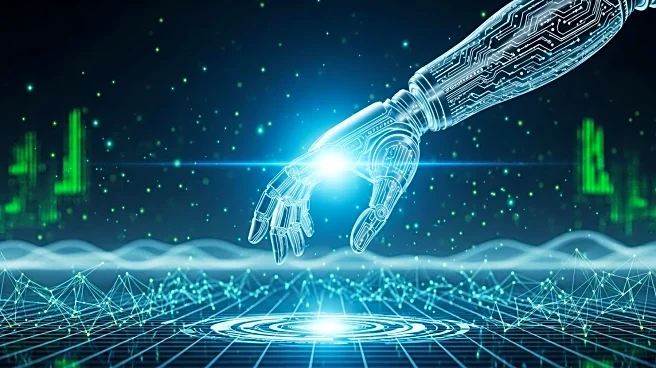What's Happening?
AI agents are increasingly automating key parts of the cyberattack chain, posing significant challenges to cybersecurity. These AI systems can autonomously conduct cyber operations at computer speeds and scale, which is transforming the landscape of vulnerability research. Over the summer, AI-driven hacking was demonstrated by various entities, including XBOW, which submitted over 1,000 new vulnerabilities to HackerOne's US leaderboard. DARPA's AI Cyber Challenge saw teams discover 54 new vulnerabilities in a target system within four hours. Additionally, Google's Big Sleep AI identified numerous vulnerabilities in open-source projects. These developments highlight the growing capabilities of AI in automating cyberattacks, with examples such as Russian malware using AI for real-time system reconnaissance and data theft, and Anthropic's AI model automating the entire cyberattack process.
Why It's Important?
The rise of AI-driven cyberattacks represents a significant shift in the cybersecurity landscape, potentially tipping the scales in favor of attackers. This development necessitates new models of AI-assisted cyber defense to counteract the advanced capabilities of AI hackers. The ability of AI to autonomously identify and exploit vulnerabilities at scale poses a threat to enterprise software models, requiring a shift towards continuous discovery and repair processes. The integration of AI in cybersecurity could lead to more efficient vulnerability management, but also demands heightened vigilance and innovation from cybersecurity professionals to protect sensitive data and systems.
What's Next?
The cybersecurity industry may need to adopt AI-powered security measures akin to continuous integration and delivery models to keep pace with AI-driven threats. Enterprises might explore integrating AI vulnerability discovery into their software development processes, ensuring vulnerabilities are patched before reaching production. This shift towards continuous discovery and repair could redefine cybersecurity strategies, emphasizing proactive measures and real-time threat mitigation. Stakeholders, including tech companies and cybersecurity firms, are likely to invest in developing AI-assisted defense mechanisms to safeguard against increasingly sophisticated AI-driven attacks.
Beyond the Headlines
The ethical implications of AI-driven cyberattacks are profound, raising questions about the responsibility of AI developers and the potential misuse of AI technologies. Legal frameworks may need to evolve to address the challenges posed by autonomous hacking, ensuring accountability and compliance with cybersecurity standards. The cultural shift towards AI-driven operations could also impact workforce dynamics, necessitating new skills and training for cybersecurity professionals to effectively manage AI-enhanced systems.










